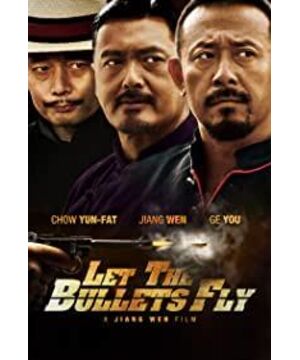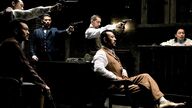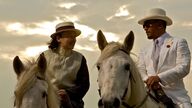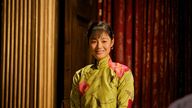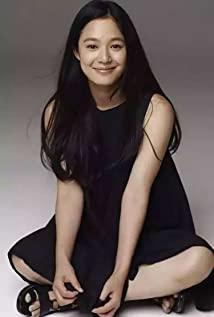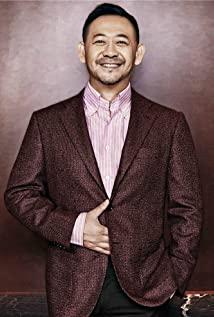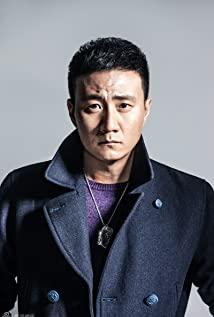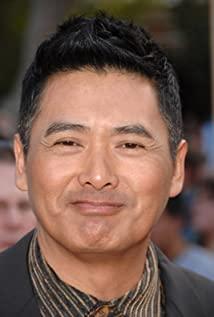The upper part of "The Sun Also Rises" is brilliant, but there are only two audiences, either absolutely naive or absolutely profound. This time Jiang Wen practiced smarter, and he allowed audiences of all levels to see good enough things.
This time Jiang Wen hid his ambitions under the superficial burden of comedy. "Let the Bullets Fly" is a commercial film, but it is more artistic than most domestic art films. I've made money, and I'm still standing. And if he hides deeper, he stands up straighter instead.
1. Some interesting details.
Talented directors often have a common feature, that is, they have a lot of personal preferences and areas of knowledge, and they will use them in their films. This time Jiang Wen, as before, has incorporated a lot of personal interests in the movie.
Horse-drawn train
Many people may find it strange to see the horse-drawn train at the beginning of the movie. In fact, the earliest railways ran on this kind of cars. Railroad tracks were first designed for horse-drawn carriages, especially in the mining area where there are many horse-drawn coal carts running on the track. Later, there was a steam locomotive.
Of course, it was strange to use horse-drawn trains in China in 1920. Firstly, it was to match the plot, and secondly, to create a sense of strangeness. Thirdly, the horse was visually free, unrestrained, and impactful, which Jiang Wen wanted to give to the book. The style of the piece.
To make a digression, regardless of whether it is making costume films or modern films, the horse breeds used in China are basically foreign sports horses. Chinese horses are relatively short, and their fur is not that good, and sometimes they seem to be crossing. But it's reasonable to make a movie. Many people may not know the flag of the
18-star flag
. A large number of appearances in this film. The red and black represent blood and iron, the yellow represents the descendants of Yan and Huang, the nine corners refer to Yugong Kyushu, and the 18 dots inside and outside refer to the 18 provinces in the interior where the Han people lived at that time (there were not many Han people in Northeast and Inner Mongolia at that time). It was the first banner of the Wuchang Uprising.
Later, after Yuan Shikai joined, the policy changed from "removing the Tartars" to "a republic of five ethnic groups." In addition, the territory exceeded the original plan for the establishment of the 18 provinces, so this flag was only used as the army flag.
In 1920, this flag should be rarely useful except for the Army. Probably Jiang Wen prefers this very nationalist style banner.
The story of Cai E and Xiaofengxian is probably known to everyone. Here is a two-person dialogue.
Xiaofengxian said: "Now the country is sluggish, hopeless, and the world is raging. The country will not be the country. Where is the price? America? Where is it? Where is it? I only value you because you have a heroic spirit."
Cai Songpo asked pretendingly, "Why
do you see it?" Xiaofengxian said, "I look at you carefully, it looks like Happy and entertaining, with depression inside. Although I am a female generation, if you do not give up, you may be able to relieve your worries, and you will treat me as a brothel!"
Jiang Wen is a person who likes heroes and has a heroic feeling. Movies The characters in the story say "follow General Songpa" and "become a little phoenix", they should be expressing themselves. The Goose City in the
Kaiping Diaolou
film was shot in Kaiping, Jiangmen, Guangdong. Jiangmen is a famous hometown of overseas Chinese. In the early years, the railways in California were basically built by Jiangmen people. Later, the group of people made money and returned to their hometown to build this combination of Chinese and Western elements to prevent flooding and banditry. There will be a wrong person for a
wrong
Japanese abdomen. The self-employed person is very painful after the abdomen, so the kendo master who is familiar and trusted by the self-employed will behead him behind him to shorten his pain. This is called wrong.
The playbook of Yanyang Tower
, also known as "Taking Gao Deng", Gao Yu's son Gao Deng deceived others and acted as a blessing.
2. The third performance of
Jiang Wen's consistent themes. Jiang Wen has made a total of four movies up to now, all with different styles. If you use literary schools to analyze it, "Sunny Day" is a stream of consciousness, "The Devil Is Coming" is realism, "The Sun Also Rises" is magical realism, and "Let the Bullets Fly" is more absurd. However, the special "Devil Is Coming" was filmed for all Chinese people. The other three are actually about Jiang Wen himself (to some extent, this can constitute an autobiographical trilogy. In fact, after watching the bullet I read a lot of things from "The Sun" that I didn't read 3 years ago), so there are many common themes. Here are a few of my deepest feelings.
heroism
In Jiang Wen's worldview, heroes are the first. Heroes change society, heroes create history. The greatest tragedy is that there are no heroes.
So Zhang Mazi took the money and it was not enough. He wanted to get rid of Huang Silang to give fairness to the people and peace to Goose City.
Jiang Wen yearned for heroes when he was young, and used heroes to demand himself as an adult. In his movies, heroes can do things that ordinary people can't do. The hero must be exaggerated. But when Jiang Wen promoted heroism, he was well aware of the weaknesses of heroism, so Xia Yu had to be responsible for large-scale gangs after smashing bricks. Six sons have a caesarean section to take jelly at the cost of life.
Only when you know the weakness of a thing, you can say that you really love it. When you love a woman, it is when you love a country.
In
essence, male impulse , heroism is actually a kind of male impulse. But here is a more direct impulse. Such as fights and sexual arousal. Jiang Wen didn't promote these things, but you can see that he thinks these things are definitely necessary, otherwise there will be no masculinity.
But the difference this time is that Jiang Wen did not give this part of things to his own role (in sunny days, Xia Yu’s role is also an incarnation of Jiang Wen himself), but to a large extent The reason for Liao Fan’s youngest person will be discussed later when we talk about “restraint”.
Infatuation with Women The
protagonist 's fascination with women in Jiang Wen's film is partly based on sexual impulse and partly not. It is attracted by a pure beauty and a perfect reflection of his inner ideals. From "Sunny Day" to "The Sun Also Rises" and then to "Let the Bullets Fly", the former has fewer and fewer ingredients, and the latter has more and more ingredients.
In "Sunny Day", the camera will focus on the quiet and plump breasts, thighs and feet, from peeping to rape. But when it comes to "Let the Bullets Fly", Zhang Mazi's fascination with Sister Hua (played by Zhou Yun) is only a faint line, which is so subtle that many people will feel abrupt when Zhang Mazi gives a gun to Sister Hua at the end. The focus of the lens has accordingly become the face, smile, and eyes.
There are three places in the film that describe Zhang Mazi's fascination with Sister Hua more intently. Apart from the last difference, one is that when she first met in the city, Sister Hua was leading the drum, Zhang Mazi's eyes and the movement of the telescope lens (Jiang Wen really likes to use binoculars to show images. It appears in large numbers in all four of his films, especially this time); the other is that Sister Hua shoots at herself and Zhang Mazi wants to be The bandit, the same look in Jiang Wen's eyes, and the soundtrack, which is slow but full of emotion.
In "The Sun Also Rises" and "Let the Bullets Fly", although Zhou Yun doesn't have many scenes, they have done the most careful treatment. Zhou Yun under Jiang Wen's lens is not like a woman who should be in the world. When she appeared, she smiled and said "I also want to send money with you and listen to them laughing", just like the person you originally thought that only existed in the depths of your inner ideals, suddenly really appeared in In front of you. She is so far away, far out of reach, yet so close, so close is in your heart.
A man has to love his wife so much that he will shoot her like this.
Romanticism The romanticism
here refers to the genre of art. Although the narrative genres of several films are different, except for "The Devil Is Coming", the performance of the images has a very prominent romanticism, and strong emotions are used as the source of aesthetic experience. Reflected in the lens, it is very random in the composition of static scenes (often there is exactly one scalp above the lens) and the lens movement of dynamic scenes. This creates a very strong effect.
Ideals
In Jiang Wen's movies, ideals are sometimes very imaginary and vague. Zhang Mazi's ideal is to divide the fields by the local tyrants, but Zhang Mazi's ideal is not to divide the fields by the local tyrants. What is Zhang Mazi's ideal? I'm afraid he can't explain it clearly. The ideal is deepest in the heart, in the green mountains and sunset in the distance. You know where it is, but you never know how to pursue it. But when the Diaolou is broken and Huang Shilang has been captured and you are smoking and chatting, you will know that it is still there waiting for you.
Three, let the bullet fly Jiang Wen
restraint
At first, Zhang Mazi was advised by his master not to kill Hu Wan on the spot to avenge the six sons. Later, he took the initiative to let the brothers withdraw from the Diaolou, and the characters Jiang Wen played in it became more and more restrained. This is actually Jiang Wen learning to restrain himself. Perhaps it can be understood as Jiang Wen's reflection and introspection after the failure of "The Sun".
But when he matures, he can no longer be so happy. So after the bandits were suppressed, Jiang Wen riding a horse from the back was sad.
Political metaphors
After the death of the master played by Ge You, the plot suddenly departed from the rhythm of the commercial film that was barely considered safe and quiet, and entered a kind of madness, telling a parable about revolution. Here are the stories I read.
The money was spread on the street, but no people dared to take it. It was secretly taken at night. During the day, Huang Shilang drove out in a carriage to collect it, and then returned it all. Zhang Mazi spread the bullets on the street again, and also secretly took it at night. The next day Huang Shilang drove the carriage to collect the horse and was beaten to death by Zhang Mazi. But when Zhang Mazi raised his arms on the street and called everyone to attack Huang Shilang, no one responded. They waited to see who could win. Until Zhang Mazi came back after catching Huang Shilang, they rushed up again and ran to the Huang Mansion to grab something, and the Shunmin became a mob in a blink of an eye. Wu Juren helped Huang Silang oppress the people on weekdays, but at this time he was the most aggressive. He was also the most ruthless in rectifying Huang Shilang.
Some people criticized Jiang Wen for still preaching the value of "dividing local tyrants". In fact, even if Jiang Wen, like Zhang Mazi, believes in fair results and encourages the masses to make revolution, he has also reflected the true situation of all parties in this incident. So different people can read different opinions from his works. This is how Jiang Wen talks about politics wisely.
Just like the devil is here, many people say they are criticizing the national inferiority, but when I finished reading it, I almost shed tears for my nation.
The echoes
from the beginning and the end correspond almost perfectly to the comparison between the beginning and the end of the film. Soaring eagles, singing along the ancient road outside Changting, railways, horse-drawn trains, rhythmic and exciting music.
However, at the beginning, it was a group of bandits who wanted to hijack the car, arbitrarily fighting and fighting. At the end, things are right and wrong. Although Qiu has been reported, people cannot be resurrected from the dead; although the goal is achieved, the ideal is still far away; the brothers are gone, with the people they love. Zhang Mazi's generation of heroes, at this moment, there are only railroad tracks, green hills, sunset, and the back view.
The film looks like a comedy on the surface, but it is actually a tragedy.
Jiang Wen’s Japanese complex
film shows Jiang Wen’s Japanese complex in many places: To send six sons abroad, let’s talk about the East; Huang Shilang wants to play with Zhang Mazi for self-decision; Daiyu and Qingwen are originally characters in the red house, but form Japanese names.
In fact, as a person who has nationalist ideas and values masculinity and dignity, it is normal to appreciate Japanese culture. I suspect that Jiang Wen's visit to the Yasukuni Shrine was actually not because of the high-sounding answers to reporters, but because of Jiang Wen's identification with the spirit of Bushido.
4. Talking about movie techniques . There are 6 people in the main role in this
performance
, Ge You, Liao Fan, Jiang Wu, Carina Lau, Zhou Yun, and the fifth youngest who doesn't know the names of the actors.
Ge You is very important. If the final box office can get 400 million or more in the box office as I expected, at least half of it will be attributed to Ge You. Ge You completed most of the funny tasks with a serious face. And without Ge You, the drama of Zhou Runfa's struggle with Jiang Wen would not come out. The chanting and facial expression modeling this time are really amazing.
Fa Ge now generally says it is box office poison, but this role may be none other than him. Fa Ge's performance is basically in place, but the chanting is still too bad, and I can't tell whether it is his own or someone else's.
Jiang Wen is basically the same as most of his films, with a slightly targeted tendency on the basis of his true qualities.
Chen Kun tried hard enough this time, which was a bit unnatural.
I thought Jiang Wu's acting skills were still above Jiang Wen, and his acting path was very wide. Although Wu Juren is only a supporting role, his role is crucial to the aforementioned political metaphors.
Carina Lau has very few scenes, but all the sketches needed for the role have come out.
Liao Fan took on the important task of expressing masculinity this time, and it was in place. The tone of some sentences was very unobtrusive and used a little Beijing accent, and the effect was very good.
Zhou Yun's level is higher than that when the sun rises as usual, not so extraordinary, but she has more skill in the ordinary, especially her eyes. I don't know if the husband and wife said that the drama is particularly good.
The unnamed fifth-timer portrayed that silly energy into the woods. Looking forward to seeing him on the big screen in the future.
It’s also worth mentioning that there are many extras in this film who also performed very well, such as the rich fat man who finally took care of Zhang Mazi. When I watched it twice, I observed the expressions of everyone in the middle of the mass uprising, and they were basically in place, and the ones in front were particularly outstanding. It is not easy for the mass performance to fail to see the falsehood. There is a lot of back-to-back
photography
. Fast forward and reverse a lot. A lot of side-backlit lenses are used to show the spirit of Zhang Mazi and his brothers with halos.
In the scene of Hongmen Banquet, a ring was placed on the outside of the dining table, and 3 cameras were placed at equal distances, rotating counterclockwise at a slow speed, and combining the front and back shots, the effect was excellent. A similar method was used again later.
Fighting bandits on the mountain is a classic in movie history.
The music
used the soundtrack given by Joe Hisaishi for "The Sun Also Rises", and the effect is better than last time because of the sufficient plot. There is a rule. When Jiang Wen is very commercial telling jokes or developing necessary stories, there is no soundtrack; every time Jiang Wen plays the style, the soundtrack comes up and the
editing
is fast from beginning to end, so that the audience has always been very high. , But it also made some people too late to think, fail to pay attention to the details, and accused the film of madness and superficiality.
5. I feel
that there are few art films that I can watch, and I like almost the only art film director, so I point to Jiang Wenzhuang. Over the past few years, I have gradually become very practical by many things. But when I see Jiang Wen's film, I feel that there are always some feelings that are worth keeping.
View more about Let the Bullets Fly reviews


